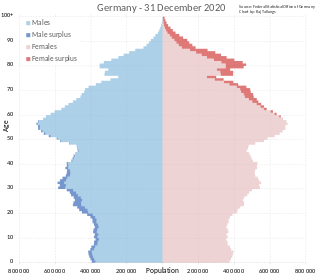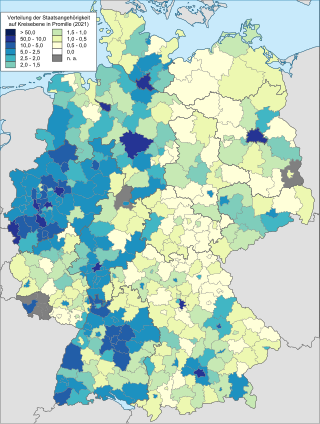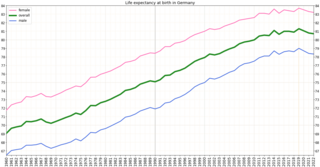
The demography of Germany is monitored by the Statistisches Bundesamt. According to the most recent data, Germany's population is 84,669,326 making it the most populous country in the European Union and the nineteenth-most populous country in the world. The total fertility rate was rated at 1.58 in 2021, significantly below the replacement rate of 2.1. For a long time Germany had one of the world's lowest fertility rates of around 1.3 to 1.4, however there has been a small increase in recent years. Due to the low birth rate Germany has recorded more deaths than births every year since 1972, which means 2021 was the 50th consecutive year the German population would have decreased without immigration. However, due to immigration the population has actually increased during the last half-century. In 2019 the number of people with a foreign background was 26%; this category includes foreigners, naturalized citizens, ethnic German repatriates from Eastern Europe and the children of all of the above.
The Children and Family Court Advisory and Support Service (Cafcass) is a non-departmental public body in England set up to promote the welfare of children and families involved in family court. It was formed in April 2001 under the provisions of the Criminal Justice and Court Services Act 2000 and is accountable to Parliament through the Ministry of Justice. Cafcass is independent of the courts, social services, education, health authorities and all similar agencies.
Children's rights or the rights of children are a subset of human rights with particular attention to the rights of special protection and care afforded to minors. The 1989 Convention on the Rights of the Child (CRC) defines a child as "any human being below the age of eighteen years, unless under the law applicable to the child, majority is attained earlier." Children's rights includes their right to association with both parents, human identity as well as the basic needs for physical protection, food, universal state-paid education, health care, and criminal laws appropriate for the age and development of the child, equal protection of the child's civil rights, and freedom from discrimination on the basis of the child's race, gender, sexual orientation, gender identity, national origin, religion, disability, color, ethnicity, or other characteristics.
The Administration for Children and Families (ACF) is a division of the United States Department of Health and Human Services (HHS). It is headed by the assistant secretary of health and human services for children and families. It has a $49 billion budget for 60 programs that target children, youth and families. These programs include assistance with welfare, child support enforcement, adoption assistance, foster care, child care, and child abuse. The agency employs approximately 1,700 staff, including 1,200 federal employees and 500 contractors, where 60% are based in Washington, DC, with the remaining in regional offices located in Boston, New York City, Philadelphia, Atlanta, Chicago, Dallas, Kansas City (Missouri), Denver, San Francisco, and Seattle.
Child protection is the safeguarding of children from violence, exploitation, abuse, and neglect. It involves identifying signs of potential harm. This includes responding to allegations or suspicions of abuse, providing support and services to protect children, and holding those who have harmed them accountable.
Child Protective Services (CPS) is a government agency that investigates allegations of child abuse or neglect, and if confirmed, intervenes by providing services to the family through a safety plan, in-home monitoring, supervision, or placing the child in foster care which may involve removing them from the custody of their parent or legal guardian.

The Federal Statistical Office is a federal authority of Germany. It reports to the Federal Ministry of the Interior.

Pakistani-Germans refers to the community in Germany of Pakistani heritage or citizenship.
Statistics Austria, known locally as Statistik Austria, is the official name of Austria's Federal Statistical Office, the country's agency for collecting and publishing official statistics related to Austria.
The Norwegian Child Welfare Services is the public agency responsible for child welfare in Norway. They consist of services in each municipality, which are aided and supervised by different governmental bodies at the state as well as the county level.

Serbs in Germany refers to persons living in Germany who have total or partial Serbian ancestry. They form the seventh largest group of foreigners in Germany.

A national census in Germany was held every five years from 1875 to 1910. After the World Wars, only a few full population censuses have been held, the last in 1987. The most recent census, though not a national census, was the 2011 European Union census.

The Albanians in Germany refers to the Albanian migrants in Germany and their descendants. They mostly trace their origins to Albania, Kosovo and to a lesser extent to North Macedonia and other Albanian-speaking territories in the Balkan Peninsula. Their exact number is difficult to determine as some ethnic Albanians hold German, Macedonian, Serbian or another Former Yugoslavian citizenship.
A children's ombudsman, children's commissioner, youth commissioner, child advocate, children's commission, youth ombudsman or equivalent body is a public authority in various countries charged with the protection and promotion of the rights of children and young people, either in society at large, or in specific categories such as children in contact with the care system. The agencies usually have a substantial degree of independence from the executive, the term is often used differently from the original meaning of ombudsman, it is often an umbrella term, often used as a translation convention or national human rights institutions, dealing with individual complaints, intervening with other public authorities, conducting research, and – where their mandate permits them to engage in advocacy – generally promoting children's rights in public policy, law and practice. The first children's commissioner was established in Norway in 1981. The creation of such institutions has been promoted by the United Nations Committee on the Rights of the Child, and, from 1990 onwards, by the Council of Europe.

Germany ranked 20th in the world in life expectancy in 2014 with 76.5 years for men and 82.1 years for women. It had a very low infant mortality rate, and it was eighth place in the number of practicing physicians, at 3.3 per 1,000 people
Cindy Blackstock is a Canadian Gitxsan activist for child welfare and executive director of the First Nations Child and Family Caring Society of Canada. She is also a professor for the School of Social Work at McGill University.

Foster care is the term used for a system in which a minor who has been made a ward or a non-minor, typically aged 18–21, who volunteers for placement, is placed in a relative placement, a non-related extended family (NREFM) placement, a community family home, an institution, or a group home. Relative, NREFM, and community caregivers certified by the state are typically referred to as "foster parents," "kin caregivers," "resource parents," or other local terms. The placement of the child is usually arranged through state or county social services. The institution, group home, or caregiver is reimbursed for the expenses related to caring for the child. The state via the family court and child protection agency stand in loco parentis to the minor, making all legal decisions, while the caregiver is responsible for the day-to-day care of the minor. Even while their child is in Care, typically birth parents retain Education and Medical rights and the right to contact with their child unless parental rights are terminated by the Court.

Buch am Forst is a village of 530 inhabitants in the district town (Kreisstadt) of Lichtenfels in the state of Bavaria in Germany. It is 6 kilometers northwest of Lichtenfels and at the western edge of the Lichtenfels Forest. Bundesautobahn 73 [Federal Highway] runs approximately a half-mile (1 km) to the east, while Kreisstraße [District Road] LIF27 goes through the village itself.

The Wisconsin Department of Children and Families (DCF) is an agency of the Wisconsin state government responsible for providing services to assist children and families and to oversee county offices handling those services. This includes child protective services, adoption and foster care services, and juvenile justice services. It also manages the licensing and regulation of facilities involved in the foster care and day care systems, performs background investigations of child care providers, and investigates incidents of potential child abuse or neglect. It administers the Wisconsin Works (W-2) program, the child care subsidy program, child support enforcement and paternity establishment services, and programs related to the federal Temporary Assistance to Needy Families (TANF) income support program.









